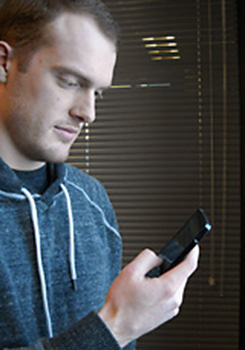
Making your smartphone and other electronic devices even smarter is Griffin Lacey’s goal. In what he calls a “once-in-a-lifetime opportunity,” the master’s student in engineering will pursue that goal by working on a mobile computing project this semester with tech giant Google.
Along with U of G visiting researcher Natalia Neverova, Lacey will spend three months at Google headquarters in Mountain View, California, on a fast-tracked tech project.
The opportunity came through their adviser, Prof. Graham Taylor, School of Engineering, who was invited to work with Google’s Advanced Technology and Projects (ATAP) group.
Guelph is the only Canadian school working with that unit, alongside about 20 prestigious American universities.
“For Guelph to be considered among them is fantastic because it shows the quality of the work we’re doing here,” says Taylor, who studies machine learning and computer vision.
ATAP aims to speed up technology development and move resulting products to market more quickly than normal; Google calls the approach a “research sprint.” Projects are expected to take no more than two years to yield usable products. Most projects are slated to be done even faster.
Although his Google agreement prevents him from sharing many details, Taylor says this particular project draws upon his research interests in deep learning, which aims to help tomorrow’s computers think more like people, ultimately making devices that are more intuitive and user-friendly.
That’s especially important for embedded systems, or the electronic brains inside products from your phone or camera, to the pumps at your neighbourhood gas station.
Improving embedded systems is Lacey’s passion. He completed his undergrad at Guelph in engineering systems and computing last year. His graduate co-adviser is engineering professor Shawki Areibi, an expert on embedded systems.
“It’s a really cool area of computer engineering,” says Lacey. “It’s a limitless field. It seems like everything has become fuelled by embedded systems, and it’s an area I want to get into because it’s growing so rapidly.”
He says “we’re trying to create models that can solve tasks that traditional computers are bad at but humans are good at,” such as recognizing faces or detecting fake currency.
Lacey expects his ATAP experience will help with his thesis project back at Guelph.
“To get the most out of a technical experience, you have to go to Silicon Valley. Being around a culture of innovation will be beneficial to my career and my studies here.”
A doctoral student working on deep learning in robotics and computer vision at the National Institute of Applied Science in France, Neverova hopes her studies will help humans and computers work better together in such fields as education, elder care and entertainment.
ATAP was launched in 2013 by Motorola Mobility, which became part of Google last year. Work teams consist of Google employees matched up with experts at various universities. Its fast-tracked projects include equipping mobile devices with a human-scale understanding of space and motion, and making modular smartphones that allow users to swap components and applications in and out.